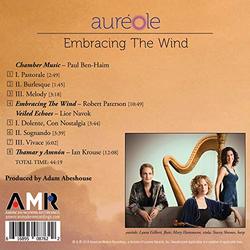| All Artists: Auréole Title: Embracing the Wind Members Wishing: 0 Total Copies: 0 Label: American Modern Recordings Release Date: 11/16/2018 Genre: Classical Style: Chamber Music Number of Discs: 1 SwapaCD Credits: 1 UPC: 616895087622 |
Search - Auréole :: Embracing the Wind
 | Auréole Embracing the Wind Genre: Classical Auréole is widely considered to be one of the world's most revered flute, viola, and harp trios. The trio has commissioned and premiered more works and released more albums for their instrumentation than any other sim... more » |
Larger Image |
CD Details
Synopsis
Product Description
Auréole is widely considered to be one of the world's most revered flute, viola, and harp trios. The trio has commissioned and premiered more works and released more albums for their instrumentation than any other similar trio in the world. 'Embracing The Wind' is Auréole's fifteenth album, and their debut recording on the AMR label. The first work on the album, by Israeli composer Paul Ben-Haim, fittingly titled 'Chamber Music,' is regarded as one of his most intimate in instrumentation and content. It explores a colorful dialogue between the three instruments that moves from playful to meditative and prayerlike. The title work on the album, 'Embracing The Wind,' is by award-winning American composer Robert Paterson and is one of his most-performed works. According to Paterson, his ''muse'' ensemble when composing this work was Auréole, so he is thrilled to be included on this album. The third piece on the album is the three-movement work 'Veiled Echoes' by Lior Navok. In the composer's words, 'Veiled Echoes' ''was written during a one month stay at Aspen, Colorado. While being surrounded by wild nature at its best, writing a trio for flute, viola and harp seemed to me as the most natural thing...'' The final work on the album, 'Thamar y Amnon' by Ian Krouse, is a chamber tone poem based on one of Federico García Lorca's 'Tres Romances Historicos (Three Historical Ballads)' from 'Romancero Gitano (Gypsy Ballads)'. This work is embedded with deep, extra-musical meaning and has deep ties to Lorca's paean to illicit eroticism.
